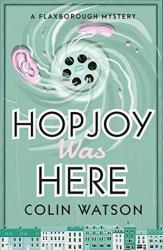The third novel in the Flaxborough series, I've always thought that it was here that Colin Watson declared his hand and intentions most firmly. Everything about this novel is slightly wacky, very English in humour and stylings, and slyly clever.
As you will get from the opening line of the blurb:
The gripping sight of four burly policeman manhandling a bath down the front path of a respectable villa isn't one the residents of Flaxborough see every day.
One would hope not, else the net curtains subsequently referred to would fray from all the twitching, and neighbours would hyperventilate from all the "making observations to Chief Inspector Purbright and Sergeant Love". Mind you it's not every day they come across a pair quite like nice Mr Gordon Periam, mild-mannered tobacconist, owner of the residence post the death of his mother; and the rather less nice, and therefore infinitely more comment worthy, Mr Brian Hopjoy, traveller, alleged spy and all round cad.
It would be too easy to provide spoilers about why the bath, why the interest in the backyard at number 14 Beatrice Avenue, and exactly who has gone missing (which is a matter of some conjecture for quite some time). But suffice to say that by the time a couple of government spooks are on the scene, everything goes a bit too James Bond for Purbright's taste, to say nothing of what it does to his senior officer.
As is the case with this series, you do need to remember that this novel was first published in 1962 (going on to win a Silver Dagger from the British CWA), so some of the observations of womanly attributes are more than a bit distasteful in this day and age, and some of the humour pushes the the bounds of political correctness to the point where some readers may find themselves more than a bit startled.
Having come to the series sometime in the '70's (luckily as I doubt I'd have snuck it past parental supervision in the early '60s), I've always been utterly beguiled by the wry, witty, slightly lunatic stylings of the novels, and HOPJOY WAS HERE has been a bit of a favourite because the plot is so devilishly clever to boot.
The full series, in order is:
Coffin, Scarcely Used (1958)
Bump in the Night (1960)
Hopjoy Was Here (1962)
Lonelyheart 4122 (1967) (in which Miss Lucilla Teatime makes her first appearance)
Charity Ends at Home (1968)
The Flaxborough Crab (1969) - U.S: Just What the Doctor Ordered
Broomsticks over Flaxborough (1972) - U.S: Kissing Covens
The Naked Nuns (1975) - U.S: Six Nuns and a Shotgun
One Man's Meat (1977) - U.S: It Shouldn't Happen to a Dog
Blue Murder (1979) (Miss Teatime does not make an appearance in this one)
Plaster Sinners (1980)
Whatever's Been Going on at Mumblesby? (1982)
It's also worth reading his study of interwar thrillers (if you can find a copy) Snobbery with Violence which Watson wrote in 1971.
Hopjoy Was Here

The gripping sight of four burly policeman manhandling a bath down the front path of a respectable villa isn’t one the residents of Flaxborough see every day.
Net curtains twitch furiously, and neighbours have observations to make to Chief Inspector Purbright and Sergeant Love about the inhabitants of 14, Beatrice Avenue. Nice Gordon Periam, the mild-mannered tobacconist, and his rather less nice (in fact a bit of a bounder) lodger Brian Hopjoy had apparently shared the house amicably.
But now neither man is to be found and something very disagreeable seems to be lurking in the drains… Then a couple of government spooks turn up, one with an eye for the ladies – the drama is acquiring overtones of a Bond movie!
Add comment